- Home
- Peter Orullian
Sacrifice of the First Sheason
Sacrifice of the First Sheason Read online
Contents
Sacrifice of the First Sheason
The story that follows is the first work of fiction set in the Vault of Heaven universe by a new epic fantasy writer named Peter Orullian. Peter has had a few short stories published, but “The Sacrifice of the First Sheason” introduces a world of long, tragic history in which there are no easy answers, and many mysteries that will be revealed, each in its own time, many of them in The Vault of Heaven, a series of novels which Tor will begin publishing with The Unremembered, this coming April.
Following “Sacrifice of the First Sheason,” Tor.com will publish two more stories set in this universe, and another nine tales will appear on the author’s website, www.orullian.com. Each of these stories is independent of the novels and of the other stories, though they share the same background.
This first tale takes place long before the action of The Unremembered. Other stories to come will deal with historical events that helped to shape later events in the world’s development that are keys to one or another element of the narrative of The Unremembered or a subsequent novel in the series. But each online story stands completely on its own.
At Tor, we have published quite a number of epic fantasy authors, and I personally have edited a lot of different series, from the multi-layered epics of Kate Elliott’s Crossroads books to the early heroic tales of Terry Goodkind; from David B. Coe’s Forelands and Southlands sagas to the Long Price Quartet of Daniel Abraham…and many others equally memorable. At SF conventions, readers will often ask me which is the epic fantasy that I love the most, but that’s a question I have never been able to answer. It’s like asking a parent which is his favorite child. It’s an impossible question.
They’re all different, of course, each with its own pleasures and rewards. The other question readers ask is what attracts me to the work or one author or another. And that’s not quite as hard to answer: I like what I like. Editors are readers first, and what we like as readers is…well, like any reader, we know when we see something we really like.
When I first read Peter Orullian’s early draft of The Unremembered, I was attracted by the characters, and then by mysteries in the story that made me feel I absolutely had to find out what was going on. Then, as I read more, I realized that I was hooked on his world, which has a rich history and culture, as well as some surprises I couldn’t have anticipated.
I also was fascinated by the unique connection of music to the magic of the world, something that readers will discover in The Unremembered. And there is a passion running through his narrative that is the hallmark of great storytelling. Without the excitement of great storytelling, there is no great epic fantasy.
So here’s the very first story set in Peter Orullian’s world, a tale from early in that world’s history. I hope you enjoy it as much as I did.
Deep in the Divide Mountains, wind and thunder shook conifers that towered a hundred strides tall. Rain fell hard, battering the village of Estem Salo and leaving it awash in the sound of rushing waters. Lightning struck every few moments, flashing the world beyond Palamon Dal Solaas’ window in stark, momentary relief before darkness reclaimed the heights around his home. Beside him, Solera slept soundly, nestled into the crook of his arm. But he could not sleep, finding the tempest in the heavens too disquieting. So, when Palamon first heard the pounding at his door over the tumult of the storm, he had a sense of foreboding about the late night caller. Who would brave these storms at this hour?
The heavy beating at his door came again, faster this time, more insistent. Quickly but carefully he freed his arm from beneath his slumbering companion and hurried to the door. He could imagine only a member of the council coming to him at this hour. He’d seen them in private chambers often lately; perhaps this visit was related to these new secrets. His visitor would likely be Dossolum, the Voice of the Council, who’d been struggling to maintain balance as the Founders labored to complete their formation of this world.
When Palamon pulled open his door, he looked instead into the dripping, strained face of his fellow Sheason, Manoa.
“Palamon, please, will you come with me? There’s trouble and I need help.” Manoa ran a hand over his face in a futile attempt to wipe off the rain, which struck his cheeks and forehead in torrents.
Palamon did not hesitate. As he pulled on a heavy greatcloak and slipped into high boots set beside his door, he asked, “What is the problem?”
“There’s a disturbance of some kind in the town of Melas Tal. They’ve sent for me as intercessor.” Manoa stood back and pointed an arm weighted by his own sodden cloak toward a figure in shadow sitting astride a horse. “This man will show us the way.”
“You usually don’t ask for help, my friend,” Palamon said. “What is this disturbance?”
Just then Solera came into the room, bearing a hand lamp that dimly lit the walls around them. “What is it, Palamon?” she asked.
Manoa explained. “This man’s wife,” he said, still indicating the shadowed man waiting several paces back in the night, “there are complications with the birth of her child. I would tend to her, but there is trouble elsewhere in Melas Tal. Palamon. Please, we must go.”
The other Sheason looked back at his companion. “I will be back as quickly as I can.”
Solera nodded, and came close to give him a brief kiss. She then shut the door behind him as he ran to his mount, which Manoa already had waiting for him. The other man came into dim view as Palamon climbed into his saddle. His eyes looked haunted, his face drawn with sleeplessness and worry. His great beard did not move when he offered a “thank you” Palamon could barely hear over the sound of the downpour.
The bearded man led them into the night. Palamon focused on the dark trail, working to keep pace with the man, whom Manoa called Efram. They slowed several times, but only to rest the horses before pushing hard again through the night and the storm. Three hours they rode before coming upon the town. Manoa bade them farewell, then veered sharply to the north on his own errand.
Palamon continued to follow Efram, and shortly they were pulling up beside a low cottage that seemed to hunker close to the earth in the darkness. They dismounted fast, and the man got the door open as Palamon rushed inside.
What he saw nearly stopped his heart.
In a simple home, adorned with hand-hewn chairs and uneven pots and thick shawls knitted of dull brown yarn, a young girl, maybe six years old, sat at the foot of her mother’s bed holding an infant that did not cry or stir. Palamon kept moving, his own boots loud in his ears as he neared the child. Closer, he could see a bluish hue to the babe’s skin. At that moment, Efram swept past him and landed hard on his knees in front of his daughter, who began to weep as her father wrapped both her and her dead baby brother in a grief-stricken embrace.
“I didn’t know what to do,” the little girl said through her sobs. “I tried and tried, but he stopped breathing. Mama is too sick. There was no one else to help…”
Efram brushed tears from his daughter’s cheeks and gently took the babe from her arms. He looked down at the child’s face with a profound sadness Palamon would never forget. Then the man tenderly pulled the blanket swaddling the babe around to cover its face, and gently laid it in a nearby crib fashioned of whittled pine boughs sitting at the foot of the bed.
After a moment there, the man knelt at his wife’s side and stroked her forehead to rouse her. “Volleia,” he whispered. “Volleia, I’ve brought help.”
The woman’s eyes fluttered open. “My child.”
Efram lied. “The baby is fine, dear one, no need to bother with that. But you, how are you?”
Volleia never replied, her eyes closing again. Efram pulle
d back the covers and showed Palamon.
“She’s lost a lot of blood, Sheason. Too much. And she still bleeds.” The man turned around, still on his knees, and took Palamon’s hand in his own rough-skinned palms. “I beg you, don’t let her die.”
Efram’s voice remained steady, but came so softly that Palamon almost could not hear it. “I came too late to save my son; don’t let me lose my dear one, too.”
Palamon then sensed another presence and turned to see the young girl likewise kneeling before him. She reached up with her small hand and put it over her father’s.
As Sheason, he had studied healing arts, and might be able to help, but there was no guarantee. And their supplication made him uncomfortable besides. He lifted their hands, urging them to their feet, and away from the bed.
He sat at the woman’s side and leaned close, and gently placed a hand on her chest. She stirred, and opened her eyes. She looked up at him, staring first at the Sheason pendant hanging around his neck, then up into his face.
After a moment, silent tears began to fall from the corners of her eyes. “My child is dead. I can see it in your face,” Volleia whispered. She swallowed hard. “Can you not save my son?” she asked.
Palamon could hear his own breath, hear the creak of the bed and floorboards and the burn of the lamp. He heard the howl of the storm beyond the cottage walls, and thought he could hear the strained cry of a newborn in the wind that shrilled around the eaves. In that moment, he felt a kind of grief he had not ever felt.
He looked back at the pleading mother and said as tenderly as he could, “My good woman, it is not given to me to breathe life back into a form that has gone to its earth. But I ask you not to despair. These loved ones behind me need you, and it will take all our combined strength to make you well.”
But she did not hear most of his words. Even now she slipped toward death. Perhaps the realization that her babe could not be saved was too much to bear, and so she yielded to death’s embrace. Or maybe she was fighting to stay alive. Regardless, Palamon knew he faced a mighty challenge. Her life energy was fading fast, and despite all he could do, she might yet pass this life and leave her family behind.
Palamon lowered his head and began to utter words in the conceiver tongue. He drew out healing herbs and pried open her mouth, crumbling them onto her tongue. He had cold water brought, and wiped the woman down to reduce her fever, likewise cleansing her body of the blood and applying a salve to the damage in her womanhood to stop further bleeding. He hadn’t the power to render the Will to heal her, but his quiet words seemed to impart the stillness of peace as best he could to her battered mother’s soul.
For hours he worked, constantly cooling her skin with a wet rag, administering further doses of herb, speaking words of comfort and hope though she remained unconscious. Near on to morning, his strength flagged, having offered so much of himself that he began to swoon. He braced himself with one arm and kept on. At last, his own eyes closed and he felt himself falling from exhaustion.
When Manoa roused him he did not know how long he’d been sleeping.
“Palamon.”
On his lips, Palamon tasted the mint of the Cloudwood sprig the Sheason harvested and used for renewal. No doubt his friend had placed it on Palamon’s tongue while he slept.
“She is well?” Palamon asked, feeling some certainty about it, and sat up.
In reply, Manoa stood back, allowing Efram to come forward. Palamon saw grief in the man’s eyes, but strangely he thought he saw gratitude, too. The man said nothing, only looking at Palamon, his eyes never once showing tears. Rather, again his rough hands took hold of Palamon’s own, and he squeezed with a might that suggested great strength and the acknowledgment of a debt.
The young girl stepped up beside her father and offered a much-loved doll as if in payment—a gesture Palamon could tell required great sacrifice on her part. He smiled weakly, and handed the toy back to the child. “Keep her safe for me,” he said. The girl hugged the doll close to her cheek.
Manoa then assisted Palamon to his feet. It was then that he saw the woman lying under a sheet on the bed, her face covered over.
She was dead.
“I’m sorry,” Palamon offered. “I tried…”
Efram nodded.
Then Manoa helped him out of the cottage and onto his mount. Together, he and the intercessor for the people of this new world rode away as slowly and lazily as the smoke that streamed from Efram’s fieldstone chimney.
The sun broke over the mountains to the east, the storm clouds gone from the skies. Palamon thought to ask his Sheason friend what disturbance he’d seen to while Palamon had tried to save a family. But he forgot his question beneath the searing mental image of the young girl holding the dead child, the woman he’d tried to save but could not, and the receding visage of Efram, who watched them from his doorstep until the road wound out of sight of the man’s humble home.
* * *
Several days later, Palamon stood at the foot of the Tabernacle steps and frowned. Blood from the body on the marble steps above had pooled in the soft loam near his feet. The figure had been brutalized to a point where he could tell only that it had once been a man. But one thing was clear: this was no accident
The savagery of the attack, all too evident, sickened him. He looked up, as he always did when he needed to gather himself. Against the bright blue heavens, the great pillars of the Tabernacle of the Sky rose like sentinels guarding the sacred place that had witnessed the founding of the world. It stood in majesty, unassailable, beautiful, almost as if its heights held up the sky itself. And here, high in the mountains of the Divide, the sky seemed already a close thing.
Palamon took a deep, bracing breath of cool early morning air. Before this, there had not been bloodshed. Not in this world. There’d been death of the natural kind, mishap or disease or the struggle of childbirth—he knew those only too well. But this kind of death was not supposed to come until later, in due course, when intentional travail beset the races the Founders, who strode the halls of the Tabernacle, had fashioned to populate the land.
It should not have begun so soon.
Not…deliberately.
Palamon, first servant among the Sheason whom the Great Ones had created first to aid them, steeled himself to look back down at the broken body. Seeing it again, he thought he could now smell the iron in the drying blood. And though perhaps only in his mind, he thought the saw an expression of confusion and fear still resting in the man’s purpled cheeks. Whoever this had been had not expected such violence—nor would he have had cause to. Not yet.
The position of the body told another story.
This still-unnamed world—more vast than most the Fathers had created for eons—was in its infancy. Its wide geography stood yet mostly vacant of inhabitants. The exodus into the wildernesses that existed far from the Tabernacle had only just begun. Still, none of those created by the Fathers ever came here. In the land below the mountains of the Tabernacle they lived and tilled and settled. The Tabernacle itself would have been unknown to them, or if somehow known, unthinkable to approach.
Whatever had slain this man had unique knowledge of this place and meant to leave the crushed heap of flesh as a message. In its desecration of the Tabernacle…it was a warning; its presence a dire harbinger.
But from whom? Who would threaten the Council of the Gods by raining down blood on the steps to this sacred place? In this high season of creation, even those beings made deliberately to harrow the lives of men hadn’t yet such rancor or temerity. Or has something changed?
Surveying the wreckage of flesh and the red runnels of blood now stiff from hours of exposure to chill air, Palamon felt a shiver deep in his soul. Something in the founding of this world had gone wrong. He looked back up past the heights of the Tabernacle toward the open, wind-swept sky, but could not reclaim his sense of peace. Some taint had gotten into the very fabric of things. He could feel it.
Perhaps it was
because he worked so closely with Dossolum, the Voice of the Council, that he sensed such things. The long periods he’d spent together with Dossolum in consultation, recording what had been done, what lay ahead, retrieving archived information carried forward from other worlds…all of it endowed Palamon with an understanding none of the other Sheason possessed. Dossolum trusted him more than the other Founders did their attendants, helping Palamon to gain—over years of counsel and attentive service—an acute intuition.
As he slowly climbed toward the battered body, something came into terrible focus. He shook his head as he knelt beside the lifeless form and gingerly pulled it over onto its back. Grief and fear struck him when he saw that the dead man was Manoa. Not a man created by the Fathers to live in this world, but a Sheason, like Palamon himself…
In this fledgling place, Manoa had held a special stewardship: to guide and teach. He’d worn the mantle of intercessor with the Great Ones on behalf of men, for those times when the work at the Founders’ hands might prove imbalanced.
If laying a torn and bloodied body on the steps of the Tabernacle had been a message, this was a challenge. Or worse. It showed utter disregard for the Tabernacle and those who walked its vaulted halls. Could there have been something more ancient, something more malevolent residing in the very matter they’d used to create this youngest of worlds?
Staring into one of Manoa’s empty eye-sockets, Palamon thought it could be nothing as remarkable as that. Rather, as he recalled the gentleness of this servant, how the man had delighted in the companionship of others; how he had struggled—but persisted—with his own efforts at song, and laughed to make others feel comfortable when argument over the work grew heated, Palamon’s suspicions grew. He became convinced that whatever—whoever—was to blame had been specifically aware of the significance of this death, this Sheason.
And so, sitting at the foot of creation, next to the tortured body of a gentle man, he grieved. But in his heart he felt also the stirrings of wrath—an anger that had as yet no target.

 At the Manger
At the Manger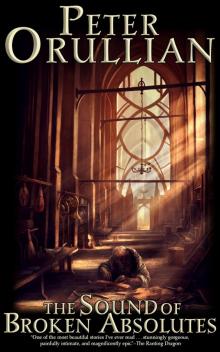 The Sound of Broken Absolutes
The Sound of Broken Absolutes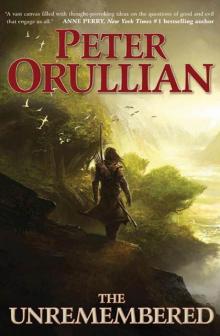 The Unremembered: Book One of The Vault of Heaven
The Unremembered: Book One of The Vault of Heaven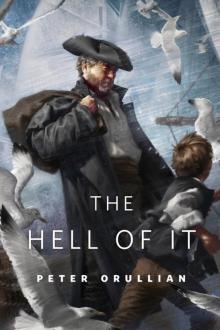 The Hell of It
The Hell of It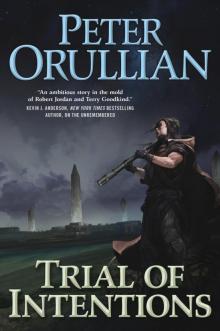 Trial of Intentions
Trial of Intentions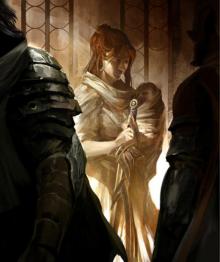 The Great Defense of Layosah
The Great Defense of Layosah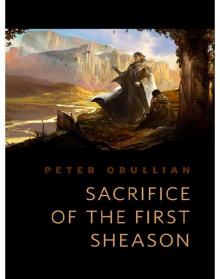 Sacrifice of the First Sheason
Sacrifice of the First Sheason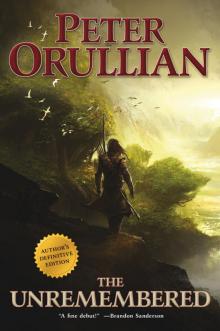 The Unremembered
The Unremembered